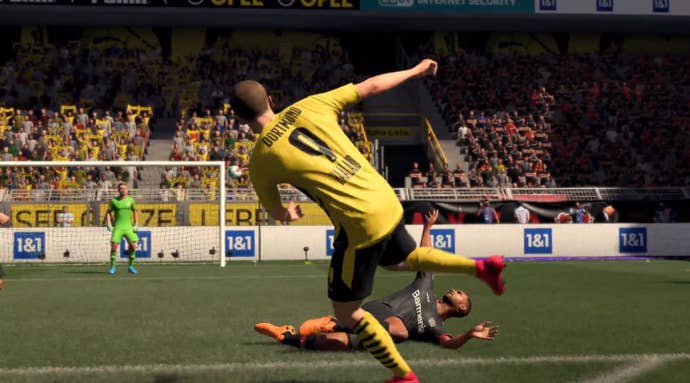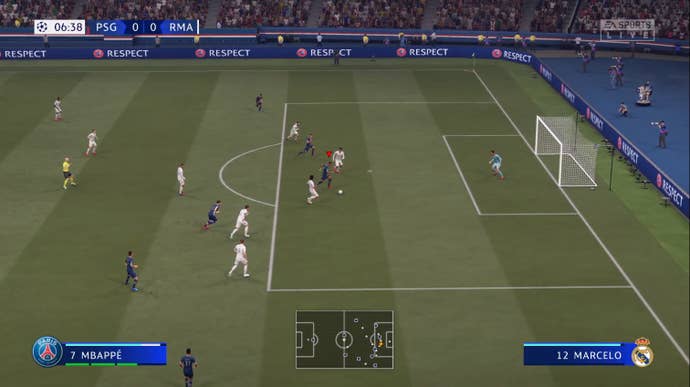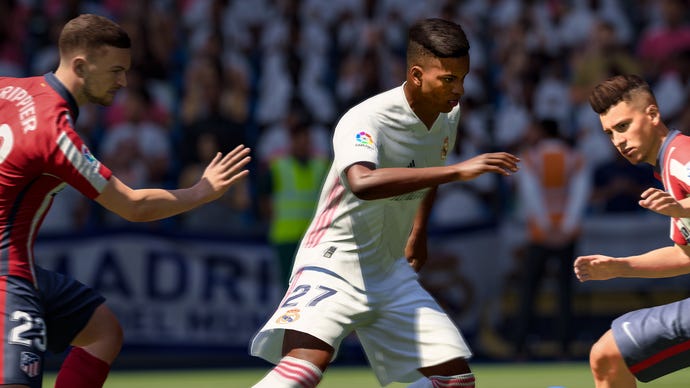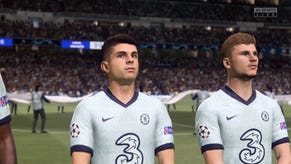FIFA 21's Battle With Lag, And What EA Has to Say About Other Longstanding Gameplay Problems
"FIFA 21 is the most responsive game we've ever made," EA says.
This article first appeared on USgamer, a partner publication of VG247. Some content, such as this article, has been migrated to VG247 for posterity after USgamer's closure - but it has not been edited or further vetted by the VG247 team.
Lag is a hot topic of conversation among many FIFA fans. Spend any amount of time in the various subreddits, and you'll see a steady stream of invective from fans who attribute success to one's proximity to server farms in California or Germany. Lengthy threads will appear breaking down FIFA's net code and where the writer feels EA has gone wrong.
It's this pervasive feeling that FIFA's online play is broken—even moreso than the career mode bugs or the microtransactions—that seems to be at the root of the greatest part of the community's frustration. It's not just lag, either. Gameplay balance has been a large issue over the past few years, leading to a large number of patches designed to address fan feedback.
Still, in getting a chance to talk with FIFA 21 Producer Sam Rivera at a recent event, lag was as good as any place to start. Asked for his perspective on the issue, Rivera began by acknowledging the feedback, saying that EA has indeed heard from professional FIFA players and influencers in the Game Changers program. Rivera says the result has been two initiatives.
"The first is in terms of servers and connectivity. A lot of that has already been released in Pitch Notes, and we will continue to release Pitch Notes in that area," Rivera says, referring to a late 2019 post detailing EA's response to lag issues.
In the article, EA discusses the "unique challenges" of optimizing FIFA for online play, as well as its build on its network of data centers and improve matchingmaking. "We're going to be as transparent as we can be," the post reads.
Fast-forward to the release of FIFA 21, and Rivera says that responsive controls are the other part of ameliorating the feeling of being bogged down by lag. Indeed, the feeling of sluggishness in previous games was frequently exacerbated by complex skill moves that failed to register.
"To give you an example, if you do a skill move, let's say heel to heel, sometimes you do it so fast that the input would not go through the center," Rivera says. "So you go forward, then right away in the next frame go backward, but the system requires you to go through the center. So because there is no center, the skill move doesn't trigger."
Rivera touts the improvements made to FIFA 21's animation system, saying they can transition much faster. "I can tell you that FIFA 21 is the most responsive game we've ever made," he says.
FIFA's Battle With Balance
Rivera's claim stands out because FIFA has been battling sluggish controls since at least FIFA 17-the year the series made the move to EA's propietary Frostbite Engine. Since then, EA has made intermittent improvements, only for its progress to be erased by a major patch.
The intense whiplash of FIFA's gameplay balance naturally gives one pause, especially when weighing the various improvements being touted in this year's version, such as "agile dribbling." The community is hesitant as well. As fun as the FIFA 21 beta was a couple weekends ago-and it was plenty fun—it's easy to wonder whether everyone will be back to complaining by November and December.

Rivera acknowledges some of this negativity as valid, but shrugs off other complaints. "When the game starts becoming more competitive, there are things that come up. We put out a lot of patches last year," he says. "In fact, in terms of gameplay, we kept patching all the way to March, which is something we've never done. This was to continue making sure that the experience was the best we could provide."
When putting together a new patch, Rivera says that the FIFA team considers "different types of metrics to evaluate feedback," from the conversations with professional players to tournaments. He talks about the efforts to address last year's complaints about dropback defense, in which it became common to commit every player to defending the goal area, dramatically slowing the pace of the game.
Some of those issues were valid, Rivera says. Competitive players were indeed playing very defensively in tournaments. Rivera says that EA ultimately tweaked dropback defense in a patch, but that internal metrics told a somewhat different story than the one being pushed on Reddit and elsewhere. Indeed, Rivera says, FIFA 20 was "the FIFA with the most amount of goals per match that we've ever made."
"For most of the community, they're having a very good experience," Rivera says. "So we try and target fixes just for the competitive world, who play the game in a very different way."
Breaking the Cycle
Regardless of EA's efforts, FIFA has lately been trapped in a tough cycle where initial praise dissipates amid a sense of malaise and frustration. Even if it enjoys strong reviews out of the gate, the real test will be the first major patch.
For now, at least, FIFA 21's touted improvements are mostly pretty promising. A new emphasis on passing and positional awareness has the potential to elevate the game's Thomas Mullers-world class players who tend to be overlooked because they lack pace or dribbling ability. It will be possible to manually direct players in the box, and the collision system is being worked so it's not as awkward. There's still no video review [VAR], but given how controversial it has proven in the Premier League and elsewhere, that may be for the best.

These improvements were certainly apparent in the FIFA 21 beta, in which I was able to fire off long diagonal passes to wingers darting intelligently into space. It gives me some hope that FIFA 21 will close the generation on a high note, as many other sports sims have done in the past. Then again, the problems with the Frostbite Engine may well be so pervasive that they can't be fixed on current-generation consoles.
If that is indeed the case, then at least FIFA 21 will have another chance at the proverbial goal when PS5 and Xbox Series X launch later this year. While we wait though, the current generation version of FIFA 21 can provide a hint of whether EA will be able to avoid succumbing to another year of negativity from its fans. We'll see when it arrives on PS4, Xbox One, and PC on October 9.







